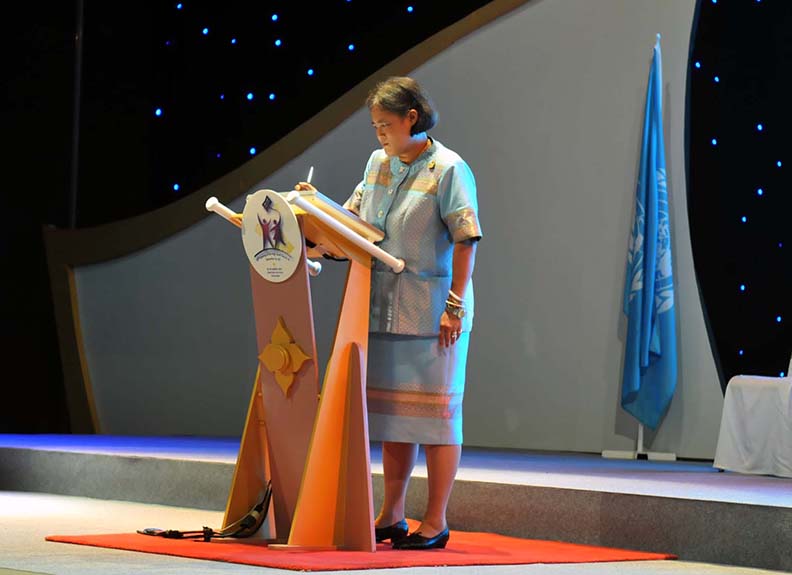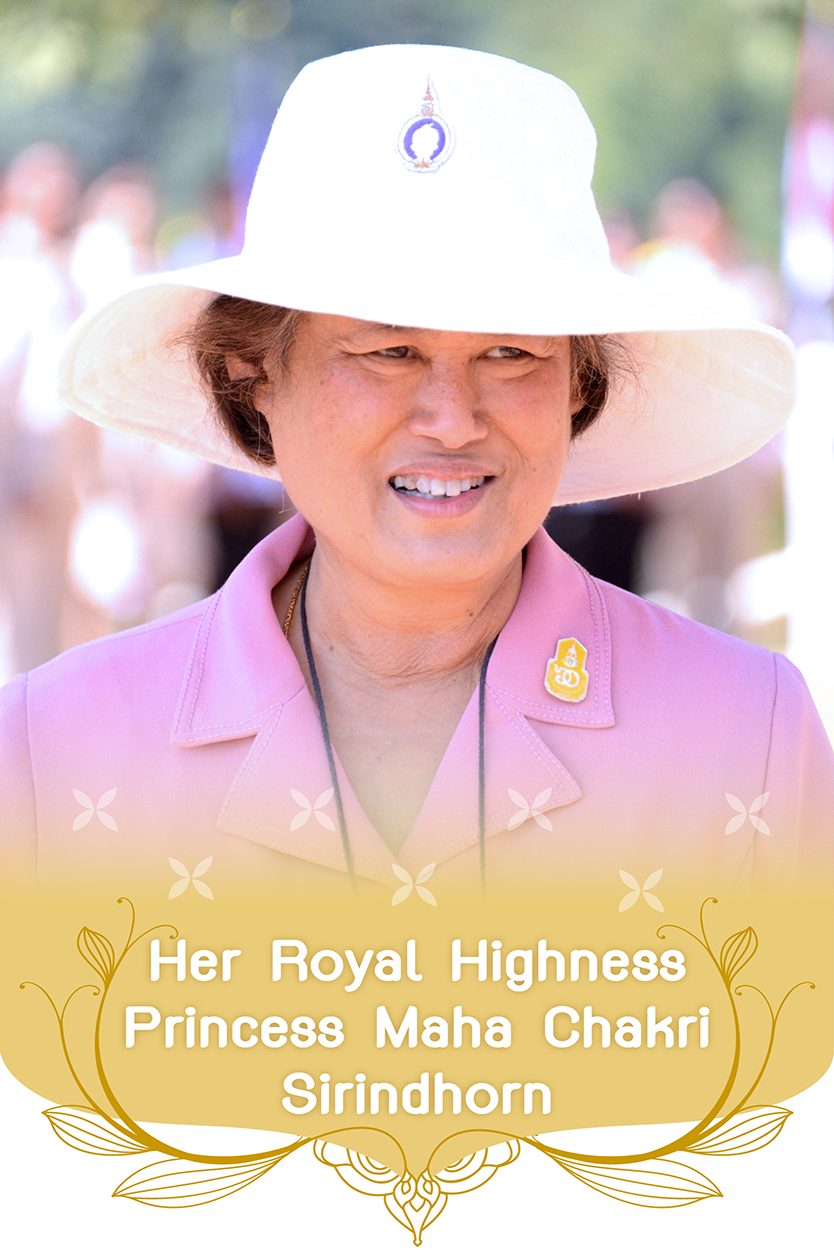Opening Address by
Her Royal Highness Princess Maha Chakri Sirindhorn at the 10th Meeting of the High Level Group on Education for All Royal Cliff Beach Resort, Jomtien-Pattaya, Chonburi Province, Thailand
Tuesday March 22, 2011, 16.30 hr.

Madam Irina Bokova, Director General of UNESCO, Prime Minister Abhisit Vejjajiva,
Excellencies, Distinguished Guests, Ladies and Gentlemen,
It is my great pleasure to address this distinguished gathering at the opening of the 10th Meeting of the High Level Group on Education for All. Welcome all of you to Thailand.
Twenty years ago, in 1990, I stood here in Jomtien before many distinguished members of the international community, assembled for the World Conference on Education, from which the Education for All or the EFA campaign was first launched. The participants of that conference pledged their support to this important global agenda, which underlined the right of all people to have quality basic education and acknowledged an obligation to meet basic learning needs.
The Jomtien Declaration in that conference has guided the world’s education development ever since. The Dakar meeting in the year 2000 injected new energy into the EFA process, and over the next 10 years a series of theme-based meetings of the High Level Group has been an impetus in maintaining momentum, reviewing progress and exploring new strategies. I myself joined the 5th High Level Group Meeting in Beijing in 2005. I have been a strong advocate of EFA, as reflected in my own work in the past 30 years and also in many more years to come.
Most countries, including Thailand, have made considerable progress towards the six goals of EFA, and I would like to congratulate all of you for the efforts towards the success of EFA.
The past twenty years were the time of rapid changes that occurred globally, posing many new problems and crises now and in the future. We are faced with climate change, environmental deterioration, natural resource depletion and diminishing fossil energy. Change in population structure towards aging society and rapid rate of urbanization in many countries have led to new socioeconomic patterns and problems in a short period of time. Climate change affects agriculture, especially in the tropical zone, where biodiversity is rich and food source is plentiful. Therefore, world food security may be at risk in the near future. There have already been many international dialogues and agreements in order to at least slow down the pace of global change and its undesirable effects. In all discussions, education is an important key.
Two decades have passed, and the EFA serves two folds from now on. One is about the six goals to secure the right of all human beings to receive basic education, and the other is about the responsibility of an individual as a global citizen to take care of the global problems. In this way Education for All is beyond literacy and skills. It includes knowledge, knowhow and concern about global issues.
More than 30 years in the remote schools, I have incorporated those issues into students’ learning activities in many ways. For example, there are environmental lessons in the formal curriculum as well as in extra-curricular activities. In each school, students work on organic agriculture to produce their own food. They learn how to manage water, energy and wastes to keep their school environment in balance. Each school has a botanical garden where students learn in-depth about plants, especially local plants and forests. From these practices, they grow love of nature and deep interest in biodiversity, genetic resource and environmental conservation. In principle, they learn and practice His Majesty’s Philosophy of Sufficiency Economy.
Education can raise awareness and build up necessary skills and habits for a person to cope with those problems at individual, family and community levels. For skilled workers they need to be educated on how an organization can contribute to society. For business and corporate leaders they should take leadership in keeping their business clean, green and energy-saving. For governmental and political leaders they should give priority to these environmental issues.
In short, the EFA should address global change firmly and continuously. Otherwise, our world could turn into a miserable place more quickly than we can imagine.
Other fast changes since 1990 are population structure and socioeconomic conditions. Statistics shows that many developing countries in the 60s and 70s, including Thailand, are catching up with the industrialized countries in many aspects. For example, some countries in Asia have fared very well in the indicators like higher per capita GDP, lower fertility rate and child mortality rate, higher life expectancy, etc.
In Thailand the population is still growing, even though the growth rate has dropped to only 0.6%. Like many countries, our population structure has changed and will change rapidly from now on. For example, there were 7.7% elderly people in 1990. Now it is about 11.8% of the 67-million population. It will be 17.2% in about 10 years, when it will exceed the number of children of age 15 and under. An agricultural country like Thailand becomes a fast-aging society, in which the fertility rate is declining, and its agricultural manpower is quickly decreasing, from about 70% to less than 40% in just two decades.
Moreover, between 1900 and 2000 the world population tripled, reaching about 6 billion in the year 2000. Adults today were born in the fastest growth period, which was about 20 years before 1990. Therefore, it is not surprising that many countries attending the first World Conference on EFA were struggling to provide education services during that boom. As a result, some of today’s adults, including the elderly, never benefited from basic education as children or adults, and are illiterate or not literate enough to secure the well-being of themselves and their families.
In the developing countries, there were many social changes in the past 20 years. For example, there are more single parents due to increased divorce rate, more migrant workers both from within and outside the countries, and consequently more newly urbanized groups in the urban areas. The urbanization rate in Thailand is about 31%, which is high, but not as high as that in some other countries. Fast urbanization destroys rural and local cultures, leading to new lifestyles that are more dependent on modern technologies and money. These are some examples of social changes in the past 20 years.
While the gaps between the industrialized countries and the developing countries in most regions have been smaller since the 70s, there may be “blind spots” at the micro level. Unlike the obvious divides like geographical conditions and socioeconomic disparity in the past, the new forms of divide can be more subtle and escape attention.
Here are a few examples. In some schools in the Bangkok Metropolitan Area, their conditions are rural even though they are located in the most urbanized area of the country. Another example is about children and youths who are arrested for crimes of the modern time, like drug possession, drug intake, etc. There are more unprepared and unready teenage mothers at younger ages, and there are more cases of HIV-AIDS. In Thailand there are about two million migrant workers, most of which are immigrants crossing the borders to sell labor, and some have children with them. There is yet an IT and technological divide, barring many people from useful information and services, etc
Education must build up conscientiousness and responsibility of all to care for the well- being of disadvantaged people as well as the deteriorating environment. “All for Education” and “Education for the Well-Being of All” are important to the future of mankind.
Most of my work in education has been devoted to improving the well-being of the disadvantaged groups. For example, I provide education for both adults and children in the remote communities, prison inmates, including children and youth detainees, chronically ill children in the hospitals, mothers in deprived conditions, ethnic or minority groups, and people with disabilities. I am happy to have an opportunity to share my experience with other countries like Myanmar, Mongolia, Bangladesh, Lao PDR, Vietnam and Cambodia.
In my 30-year experience, my primary focus has been on agriculture in schools, because agriculture is a sustainable food source and also a good learning tool. I regard schools as the centers for community development, where I concentrate on health, sanitation, environment, natural resources and cultural heritage through education and trainings. My target groups are usually outside the mainstream population. I am convinced that education can really make a difference, or even a miracle, but only if we reach out to them.
Information and communication technology has also transformed our lives since 1990. His Majesty the King of Thailand has embraced technological advances as a means to reach out to people nationwide. In 1995, the Golden Anniversary of his Accession to the Throne, the Satellite Distance Learning Program was established at Klaikangwon Palace School in Hua Hin, Prachuap Kiri Khan Province. The programs are still transmitted today to the destination schools throughout Thailand. This has been most helpful to the schools that lack particular subject teachers.
It has been two years since I have had all the distance teaching materials transformed into digital form. They are now available on the website http://www.edltv.thai.net. Besides the formal curriculum, there are also many vocational lessons on this website. In the future, facilitated by the nationwide internet access policy, we should be able to provide online lessons to all. Only in a few digitally blind spots, we are testing our inexpensive technology, in trying to fill in this digital gap as soon as possible.
I have used science and technology as a tool in my EFA work. They are by no means replacing important human factors like teachers. I truly believe that education for all, under the Philosophy of Sufficiency Economy, with appropriate use of science and technology, can be achieved.
Since 2005 I have been honored by UNESCO to be their first Goodwill Ambassador from an ASEAN country. Now ASEAN countries are becoming the ASEAN Community in 2015. I hope we will be even stronger in supporting the EFA in the region. I would like to thank UNESCO and the Royal Thai Government, especially the Ministry of Education of Thailand, for co-organizing the 10th Meeting of the High Level Group in Thailand, at the place where we started the EFA movement 20 years ago. Thank you all for your contribution. Together we can explore new strategies to achieve the EFA goals, in an attempt to establish a better inclusive and peaceful world.
I now declare open the 10th Meeting of the High Level Group on Education for All, and I wish the meeting every success.
Thank you




